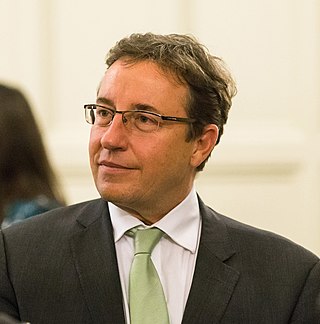Related Research Articles

The United Nations (UN) is an international organization whose stated purposes are to maintain international peace and security, develop friendly relations among nations, achieve international cooperation, and serve as a centre for harmonizing the actions of nations. It is the world's largest international organization. The UN is headquartered in New York City, and the UN has other offices in Geneva, Nairobi, Vienna, and The Hague, where the International Court of Justice is headquartered at the Peace Palace.

The United Nations General Assembly is one of the six principal organs of the United Nations (UN), serving as its main deliberative, policymaking, and representative organ. Currently in its 78th session, its powers, composition, functions, and procedures are set out in Chapter IV of the United Nations Charter.

The United Nations Economic and Social Council is one of the six principal organs of the United Nations, responsible for coordinating the economic and social fields of the organization, specifically in regards to the fifteen specialised agencies, the eight functional commissions, and the five regional commissions under its jurisdiction.

The Rome Statute of the International Criminal Court is the treaty that established the International Criminal Court (ICC). It was adopted at a diplomatic conference in Rome, Italy on 17 July 1998 and it entered into force on 1 July 2002. As of February 2024, 124 states are party to the statute. Among other things, it establishes court function, jurisdiction and structure.

The United Nations Secretariat is one of the six principal organs of the United Nations (UN), The secretariat is the UN's executive arm. The secretariat has an important role in setting the agenda for the deliberative and decision-making bodies of the UN, and the implementation of the decision of these bodies. The secretary-general, who is appointed by the General Assembly, is the head of the secretariat.

The secretary-general of the United Nations is the chief administrative officer of the United Nations and head of the United Nations Secretariat, one of the six principal organs of the United Nations.

The United Nations System consists of the United Nations' six principal bodies, the Specialized Agencies and related organizations. The UN System includes subsidiary bodies such as the separately administered funds and programmes, research and training institutes, and other subsidiary entities. Some of these organizations predate the founding of the United Nations in 1945 and were inherited after the dissolution of the League of Nations.

United Nations Water (UN-Water) is an interagency mechanism that coordinates the efforts of United Nations entities and international organizations working on water and sanitation issues.

Achim Steiner is a Brazilian-born environmentalist who currently serves as the administrator of the United Nations Development Programme and vice-chair of United Nations Sustainable Development Group.

The United Nations Peacebuilding Commission (PBC) is a United Nations intergovernmental advisory body of both the General Assembly and the Security Council that supports peace efforts in conflict affected countries. A key addition to the capacity of the international community in the broad peace agenda, it was established in 2005 with the passage of both A/RES/60/180 and S/RES/1645 Mr. Ivan Šimonović (Croatia) is the incumbent chair of PBC.
The United Nations Sustainable Development Group (UNSDG), previously the United Nations Development Group (UNDG), is a consortium of 36 United Nations funds, programmes, specialized agencies, departments and offices that play a role in development. It was created by the Secretary-General of the United Nations in order to improve the effectiveness of United Nations development activities at the country level.
Wolfgang Stöckl served as the Vice Chairman of the United Nations International Civil Service Commission.
Warren Edward Sach occupied various executive roles at the United Nations, retiring in 2013 as Assistant Secretary-General for Central Support Services.

The European Union (EU) has had permanent observer status at the United Nations (UN) since 1974, and has had enhanced participation rights since 2011. The EU itself does not have voting rights but it is represented alongside its 27 members, one of which, France, is a permanent member of the Security Council.

The United Nations System Staff College (UNSSC) is a UN organization that serves the personnel of the United Nations and its affiliates via inter-agency learning and training.
The document Standards of Conduct for the International Civil Service is a text document of the United Nations System that lays out a set of standards of conduct for international civil servants. These standards were introduced in 2013 by the International Civil Service Commission (ICSC) to replace the Standards of Conduct in the International Civil Service, which had been introduced in 1954 and revised in 2001.

The United Nations General Assembly Fifth Committee is one of six main committees at the United Nations General Assembly. It deals with internal United Nations administrative and budgetary matters.

The Permanent Mission of Mexico to the United Nations is the diplomatic mission of Mexico to the United Nations in New York. The Mission is represented by the Permanent Representative. The current Mexican Permanent Representative to the United Nations is Juan Ramón de la Fuente.
References
- ↑ "Subsidiary Organs of the General Assembly: Commissions". UN. Retrieved 30 March 2016.
- ↑ "3335 (XXIX). Statute of the International Civil Service Commission" (PDF). General Assembly, Twenty-ninth Session. 18 December 1974. Retrieved 30 March 2016.
- ↑ "FAQ, General: What is the United Nations system?". ICSC. 2016. Retrieved 30 March 2016.
- ↑ "About the Commission: General Information". ICSC. 2016. Retrieved 30 March 2016.
- ↑ "The Commission | ICSC". icsc.un.org. Retrieved 2023-08-22.